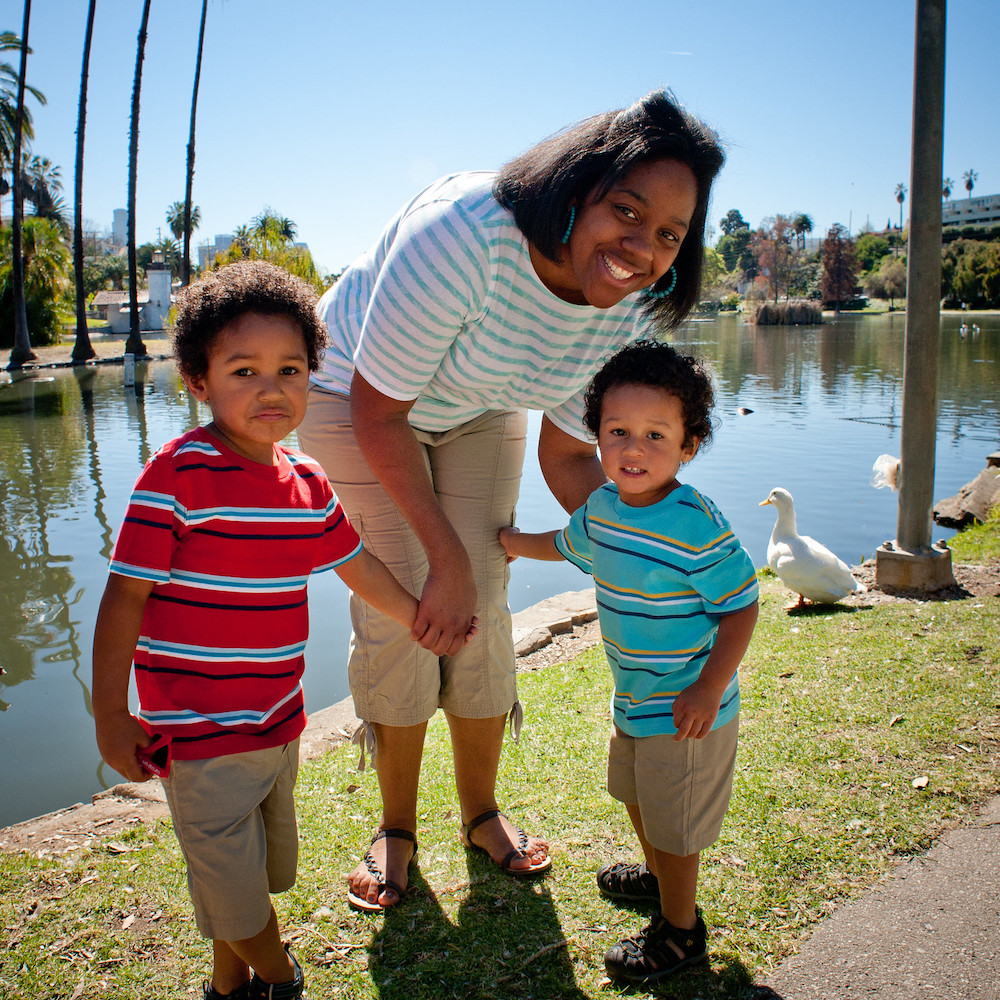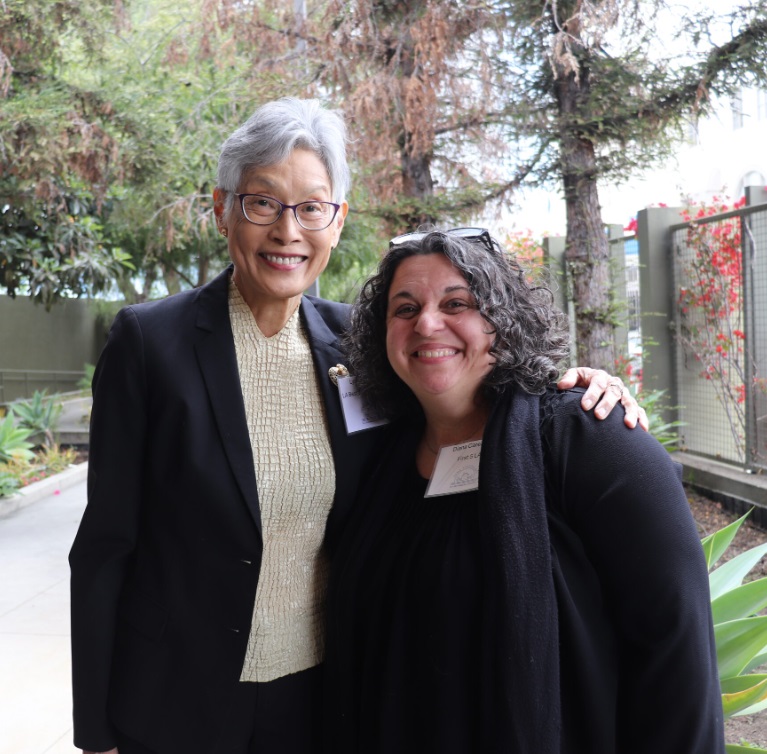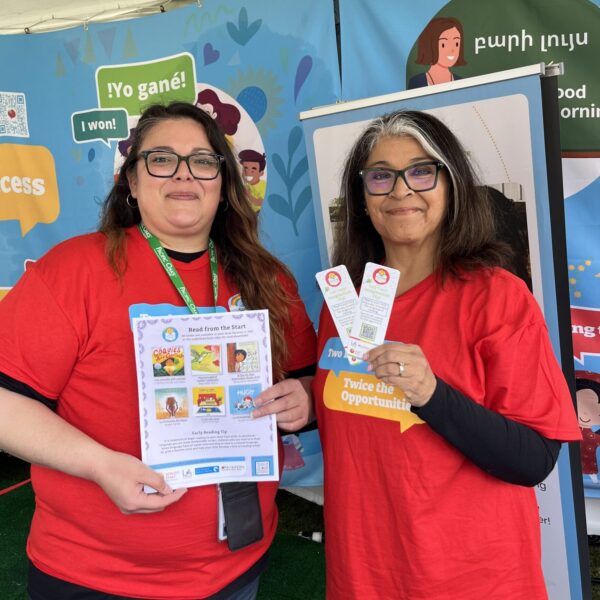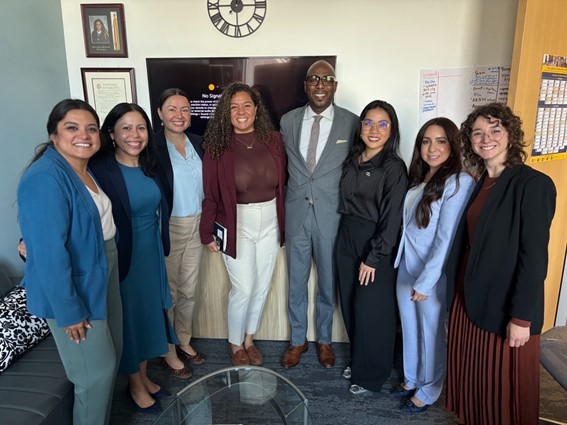July 29, 2021
After weeks of intense negotiation between legislative leadership, Budget committee chairs and the Newsom administration, the 2021-2022 California state budget was signed into law on July 12. With a projected $262.6 billion spending plan that includes $196 billion in general funds, $25.2 billion in total reserves and a total surplus of $75.7 billion, the budget provides a once-in-a-generation opportunity to invest in California kids and families at a time when it is most urgently needed.
Negotiations over the 2021-2022 state budget marked a unique moment in the state’s recent legislative history, with final ratification of the budget coming almost a month after the constitutional deadline –– an event that hasn’t occurred in 10 years. Because of this delay, the budget passed on July 12 will go into effect immediately, as July 1 marked the start of California’s fiscal year.
After the publication of Newsom’s May Revise, the Senate and Assembly released their own joint budget framework that served as the Legislature’s version of the 2021-2022 state budget. Forgoing traditional procedures, the state Assembly and Senate did not pass individual budgets and then convene a conference committee to reconcile any differences, but instead agreed to the joint framework. The two houses then passed a budget one day prior to the constitutionally mandated June 15 deadline, allowing negotiation details to continue into July.
At the heart of the disagreements, legislative leaders differed with the Department of Finance on the forecasted state revenue totals as well as statutory requirements related to the state’s appropriation threshold, known as the Gann Limit. Reimbursement rate increases for child care providers also emerged as one of the more significant points of negotiation between lawmakers and Newsom, all of which contributed to the delay in ratification.
With their agreement on the final state budget, the Legislature and Newsom administration have now concluded all planned budget negotiations for 2021-2022. However, California is receiving approximately $27 billion in direct federal resources through the American Rescue Plan in two portions; one arrived at the end of June, and the other is slated to come next year. As such, “budget junior” bills that spend this funding may be necessary, with the development of these most likely occurring later this summer or into the fall. Furthermore, even with most budgetary decisions now complete, additional trailer bills, authorizing language and budget bills could materialize throughout the rest of the legislative session, which will end on September 15.
Examining those proposals related to First 5 LA priorities that varied within the May Revise and Legislative budget frameworks is helpful in understanding how the negotiations unfolded:

- Provider Rate Increases: Reimbursement rate increases for early learning providers were a significant hurdle for lawmakers and the administration toward achieving an agreement on the budget. While the May Revise did not address reimbursement rates, the Legislature proposed $1.1 billion to implement Child Care Rate Reform for child care and state preschool programs. Lawmakers intended this money to help compensate early learning providers more adequately, especially after the additional costs incurred in response to the COVID-19 pandemic. In hopes of restoring and supporting the early care and education (ECE) workforce and mixed delivery system, the final budget contains a number of changes regarding provider reimbursement rates, including increasing all child care and preschool program rates to the 75th percentile of their county 2018 Regional Market Rate (RMR); raising all school-based preschool program rates to the 75th percentile of their county 2018 RMR (supported by $234 million in Proposition 98 General Fund in 2021-22 and $468 million ongoing); and providing $289 million in federal funds, $289 million General Fund, and $67.7 million in Proposition 98 one-time funding as supplemental rate payments to all child care and preschool providers. Lastly, the final budget ratifies the Child Care Providers United contracts, which includes — among other provisions — rate increases, provider stipends and supplemental payments, pandemic flexibilities, and mental health supports.
- Child Care Rate Reform: Increasing reimbursement rates to child care providers is an important step toward fully supporting the early learning field. However, crucial systems reform is needed to reach pay equity across the state’s mixed delivery system, with adequate compensation that reflects the true cost of care for infants and toddlers. So long as California upholds a two-rate structure, it will continue to perpetuate disparate wages for child care providers — particularly those serving in high-need communities. The final budget calls out adopting Rate Reform policy for all child care programs that will seek to create set rate targets for a single rate system beginning 2023. Additionally, budget trailer bill AB 131 (Committee on Budget) seeks to establish a Rate Reform workgroup, convened by the Department of Social Services, to inform the Joint Labor Management Committee recommendations on creating a single reimbursement rate system. Creating an equitable and adequate reimbursement system is a key advocacy priority for First 5 LA, which will also urge for the passage of SB 246 (Leyva), legislation that features critical reforms to the state’s child care rate reimbursement system toward creating a more just system of compensation.
- Child Care Seats: The Legislature proposed 100,000 child care seats beyond those the May Revise sought to fund. Following negotiations, the final budget includes 200,000 new child care spaces in Alternative Payment, General Child Care, Migrant Child Care, and bridge program for foster children program and continued prioritization of vouchers for essential workers currently receiving short-term help due to the pandemic. The state will increase spaces by 120,000 during the 2021-22 year and phase in an additional 80,000 over the next four years. While this number of new seats will help some families find much-needed child care resources, it is still wholly insufficient.
- Universal Transitional Kindergarten: Newsom’s May Revise proposed spending approximately $900 million (General Fund) in 2022-23 to begin a phase-in approach to Universal Transitional Kindergarten (UTK), growing that funding to $2.7 billion in 2024-2025. The Legislature proposed a one-year delay to implementation compared to the May Revise, opening UTK to all families with young children in 2025-2026. Following negotiations, the final budget adopted UTK as part of a mixed delivery system and approved the one-year delay for implementation by phasing in expanded age eligibility to full implementation by 2025-26. Other UTK pieces include:
- Re-benching the Proposition 98 Guarantee to provide ongoing funding for transitional kindergarten expansion of approximately $2.7 billion at full implementation.
- Requiring quality standards for transitional kindergarten, including full school-day instructional minutes, 1:12 staff to student ratio by 2022-23, and 1:10 staff to student ratio by 2023-24, subject to future Budget appropriations.
- Providing $300 million in one-time Proposition 98 for planning and implementation grants to support the preparation of preschool, transitional kindergarten and kindergarten teachers, and to support professional development in providing instruction in inclusive classrooms, support for English language learners, social-emotional learning, trauma-informed practices, restorative practices and implicit bias training.
- Providing up to $200 million for planning grants for the expansion of pre-kindergarten and kindergarten programs, including transitional kindergarten, kindergarten, Head Start and preschool programs.
- Public Health infrastructure: The Legislature proposed to provide $200 million in funding for local health jurisdictions, state public health functions and public health workforce development, as well as funding for an HIV/AIDS prevention program. Broadly, this funding, lawmakers said, would help build more modern and equitable public health infrastructure in California, which is particularly important after the COVID-19 pandemic exposed the insufficiencies of the current system. Public health advocates also lobbied intensely for the inclusion of direct funding to the state’s public health systems and infrastructure, which they felt the May Revise failed to prioritize. Following negotiations, the final budget includes appropriations above even the Legislature’s proposal, as the state will spend $300 million ongoing, starting in 2022-2023, to address public health infrastructure needs and health equity.
- Food for All: The Legislature proposed to expand eligibility for state-funded nutritional benefits to undocumented residents. Californians without legal status are otherwise unable to access CalFresh, California’s Supplemental Nutrition Assistance Program (SNAP), which is especially concerning as rates of food insecurity have increased significantly during the pandemic. The May Revise did not feature such a proposal. Following negotiations, the final state budget does expand state-funded nutrition benefits to those currently ineligible for CalFresh or the California Food Assistance Program solely due to immigration status. Automation changes to the program are set to begin immediately, with focused enrollments beginning in 2023-2024. Determinations of who will be able to enroll during this initial period will occur closer to the implementation date.
- CalWORKs Home Visiting Program: The Legislature proposed to reinstate $30 million in “ramp-up” funding for the program this year, which the governor proposed to eliminate, and restore previously made funding reductions. Ultimately, the final budget included $69.1 million in funding for the CalWORKs Home Visiting Program. Strengthening this program has been and will continue to be a significant First 5 LA policy priority; the program was, for example, a key focus of Advocacy Day meetings with legislators and their staff members, as well advocacy efforts focused on the Newsom administration.
- Telehealth: The Legislature proposed to adopt trailer bill language that aligns with AB 32 (Aguiar-Curry), which would permanently continue payment parity between audio-only and virtual services, as has occurred during the declared public health emergency due to COVID-19. However, based on recommendations from the Department of Health Care Services, the May Revise proposed to reimburse audio-only telehealth services at 65 percent of the fee-for-service rate. Negotiators ultimately could not come to a long-term agreement, with the final budget extending pandemic-related telehealth flexibilities through December 31, 2022. The Department of Health Care Services must also convene an advisory group to provide recommendations for establishing and adopting telehealth policies that increase access and reduce disparities.
- Paid Family Leave: Families participating in California’s Paid Family Leave Program currently receive 60 to 70 percent of the wages they typically earn when they take time off from work to care for a new child. However, that level of wage replacement was set to drop this year to 55 percent due to the expiration of previously passed legislation. In response, the Legislature’s budget proposed to maintain the current level of wage replacement for one additional year, while the May Revise did not feature any measures related to family leave policies. The final state budget does, in fact, extend the current wage replacement’s sunset date by one additional year.
The final 2021-2022 state budget also includes funding for the following First 5 LA priorities:
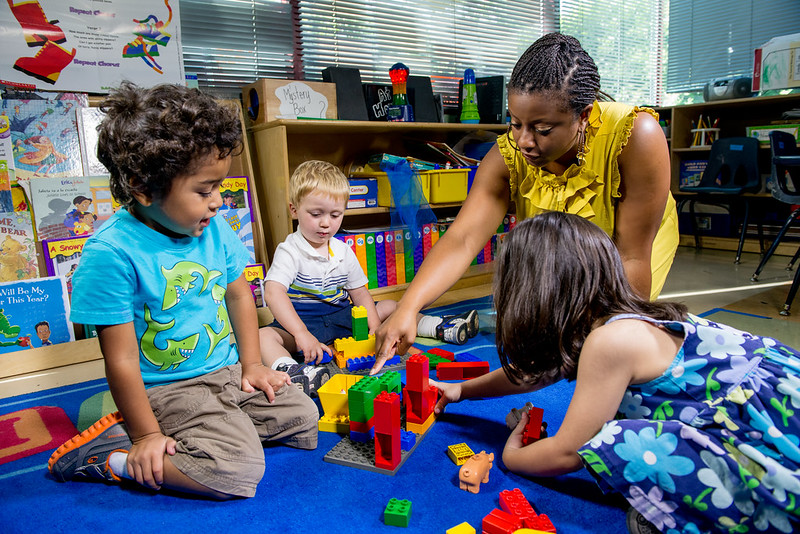
Children have high quality early care and education experiences before kindergarten.
The state budget includes:
- $250 million ($150 million in one-time General Fund and $100 million in one-time federal stimulus funds) for the construction and renovation of child care facilities. With the record number of facilities that have closed due to the impacts of COVID-19, this investment is a step toward ensuring an equitable recovery for the early learning field. It will also help improve access to ECE resources for families as parents return to work. Despite this investment, though, more support is necessary, especially given the facilities crisis that California faced even prior to the pandemic. Additional facilities will also be necessary due to the funded increase in child care slots.
- $645.7 million total funds ($289 million federal funds, $289 million General Fund, and $67.7 million one-time Proposition 98 funding) for rate payments to all child care and preschool providers to supplement the proposed increase of provider rates to the 75th percentile of their county’s 2018 regional market rate.
- $10 million ongoing federal funds for Resource & Referral agencies (R&R) to strengthen their capacity and networks. This investment comes after R&Rs demonstrated their critical role in supporting young children and families, as well as child care providers, throughout the pandemic.
- $42.048 million ongoing General Fund and federal funds for the transition of early learning, child care and nutrition programs from the California Department of Education to the Department of Social Services. Planning for this began more than a year ago, and the transition itself officially launched on July 1, 2021.
- $4.8 million in one-time Child Care and Development Grant quality funds for the planning and initial implementation of a child care data system. The final budget also includes requirements for a unique child identifier compatible with the Cradle to Career data system.
- $15 million one-time General Fund to modernize payment options for contracted child care and preschool programs. This funding will support child care providers’ ability to use direct deposit, electronically transfer funds and receive payments.
- Waiver of child care family fees for the 2021-2022 Budget Year. Family fees have been waived since the start of the pandemic. First 5 LA has an official support position on AB 92 (Reyes), which would continue waiving family fees until 2023 while developing an equitable fee schedule for families.
- A variety of one-time investments to stabilize providers growing out of the pandemic, including stipends and hold harmless policies.
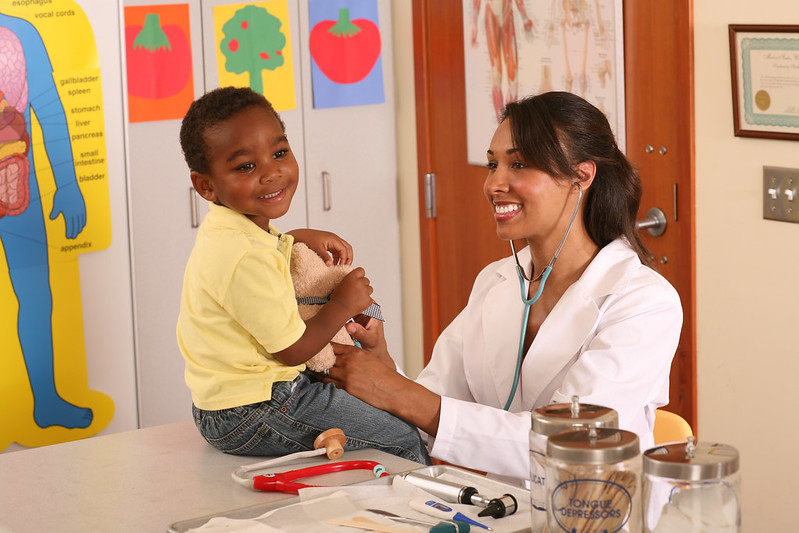
Children receive early developmental supports and services, and are safe from abuse, neglect, and other trauma.
The state budget includes:
- $800 million to support the addition of dyadic care services as a Medi-Cal benefit. This new benefit would provide integrated physical and behavioral health screening and services to the whole family. The dyadic care model has been shown to increase access to preventive care and rates of immunizations for children; improve the coordination of care and maternal mental health; and strengthen child social-emotional health and safety.
- $25 million in one-time funding to support All Children Thrive, a statewide program to mitigate the effects of adverse childhood experiences (ACEs) on children.
- $222.4 million to support implementation of the Families First Prevention Services Act (FFPSA), representing an additional $100 million above the May Revise’s proposal. Implementation of FFPSA is beginning statewide, including in L.A. County. The program prioritizes resources toward preventing the unnecessary removal of children from their families.
- Elimination of a previously proposed suspension of Proposition 56 supplemental payments. As a result, this funding will continue to support incentive payments to providers for conducting development screens and screenings for ACEs, for example.
- $2.6 million in 2021-2022 and $2.5 million annually through 2024-2025 to support the statewide Medi-Cal Managed Care Plan re-procurement effort. First 5 LA has been and will remain engaged throughout the procurement process, calling on the Department of Health Care Services to prioritize children’s health and health equity when awarding and implementing new Medi-Cal contracts.
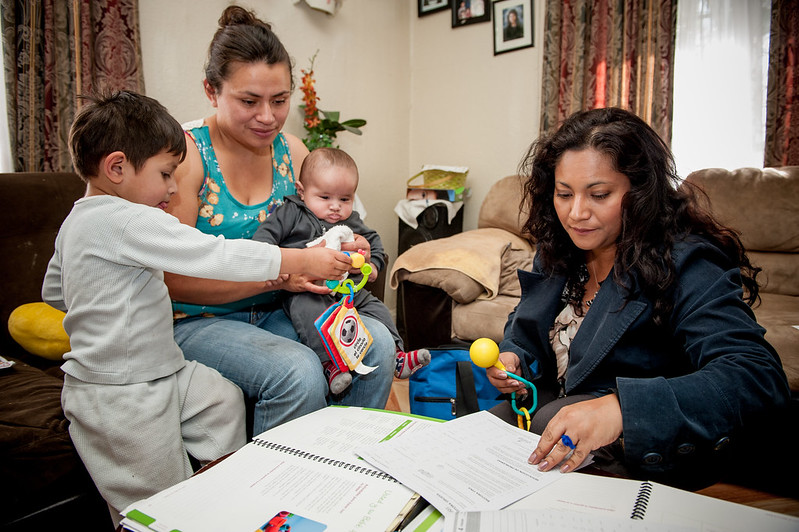
Families optimize their child’s development
The state budget includes:
- Approval of the May Revise’s proposal to extend Medi-Cal eligibility for postpartum individuals from 60 days to 12 months. Continuous health care coverage is essential for avoiding disruptions in care, particularly as one-third of all maternal deaths occur one week to one year after a pregnancy ends, and one in seven women experience symptoms of postpartum depression in the year after giving birth.
- $35 million one-time General Fund to create a statewide Universal Basic Income pilot, in alignment with the May Revise’s proposal, but now with additional language emphasizing the need to specifically support foster youth as part of the pilot.
- Annual funding to add doula services as a covered benefit in the Medi-Cal program, as well as to add community health workers to the class of health workers who are able to provide benefits and services to Medi-Cal beneficiaries, both effective January 1, 2022. These providers are important to making language- and culturally-appropriate care available to families served by Medi-Cal.
- $142.9 million to increase the maximum level of CalWORKs cash grants by 5.3 percent; and $10 million in 2021-2022 and $17 million in 2022-2023 and ongoing, to increase monthly CalWORKs pregnancy supplement aid from $47 to $100.
- $260 million in ongoing funds for Special Education Early Intervention grants to increase access to evidence-based early intervention services for infants and toddlers, as well as preschool-aged children.
- $1.6 billion total funds ($673 million General Fund) in 2021-2022 and $1.5 billion total funds ($746.6 million General Fund) in 2022-2023 to implement California Advancing and Innovating Medi-Cal (CalAIM) reforms, approving the May Revise’s proposal. The final budget also features technical, programmatic changes to CalAIM, such as requiring a workgroup to develop strategies for improving data collection and enrollee demographic information.
- Several appropriations related to improving health equity:
- $296,000 in 2021-2022 and $278,000 ongoing for the Department of Managed Health Care to establish and enforce health equity standards.
- $500,000 in grants for community-based organizations to support mental health equity programs, in partnership with county behavioral health departments.
- A post-COVID equity analysis to understand the intersections of COVID-19 and health disparities, as well as recommend strategies to address identified inequities.
- An Equity Dashboard at the Department of Health Care Services, which will report on health disparities and progress toward closing them.
- A Health Equity and Quality Committee, under the direction of the Department of Health Care Access and Information, that will make recommendations for standard health equity measures, particularly to assess equity and quality in the state’s delivery of health care. The budget would also require determinations of health plan compliance with health equity measures, and beginning in 2025, the publication of an annual report on California’s progress toward achieving equity in health.
- Several appropriations related to improving services at regional centers and Individuals with Disabilities Education Act (IDEA) early intervention services:
- $2.9 million to provide implicit bias trainings for regional center staff.
- $61.8 million ongoing, starting in 2022-2023, to enhance service coordinator ratios at the state’s regional centers.
- $10 million ongoing to support language access and cultural competency at regional centers, including culturally sensitive outreach efforts and translation services for families who are non-English speaking.
- Requirement for the Department of Social Services to establish a community navigator program that would promote the utilization of regional center services.
- Requirement for the Department of Social Services to convene a workgroup that will make recommendations for developing standard improvement indicators and benchmarks to ensure high-quality services at regional centers.
Newsom’s May Revise proposed to convene stakeholders in order to discuss data sharing and best practices for improving the transition between IDEA Part C and Part B. Children receive early intervention services through IDEA Part C services at regional centers until age 3, when they transition to services provided by school districts through IDEA Part B. However, children may fall out of the system during this transition, whether due to miscommunication between local education agencies and regional centers or because a child’s third birthday falls in the summer when schools are not in session. The Legislature decided to reject this proposal, saying it duplicated existing efforts. As a result, the final budget did not fund the governor’s proposal for an IDEA transition workgroup.
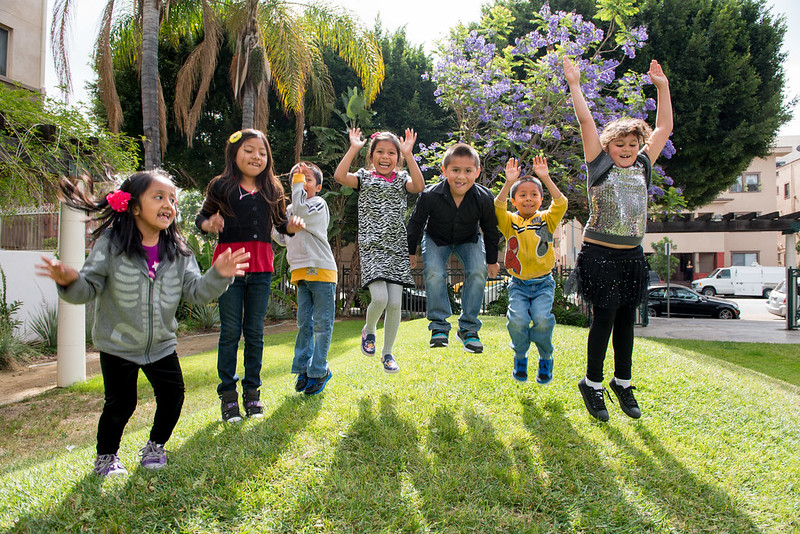
Priorities aligned with First 5 LA’s long-term systems outcomes, L.A. County regional priorities, and Best Start Community Change agendas.
The state budget includes:
- $8.1 billion total funding to provide a second round of direct financial supports through the Golden State Stimulus program. All individuals earning incomes below $75,000 will receive payments of $600, with families with young children receiving an additional $500. Finally, those filing income taxes with an Individual Taxpayer Identification Number (ITIN), most commonly undocumented California residents, will receive an additional $500. As such, families with young children can receive up to $1,110 in direct payments.
- $80 million in American Rescue Plan Act federal funds, over three years, to support legal aid services that will help renters and homeowners avoid eviction and foreclosure.
- $12 billion in new funding for homelessness programs over the next years. Funding includes $1 billion in support for local governments to address homelessness for both 2021-2022 and 2022-2023, with additional years upon appropriation. This is the first multi-year commitment made by the state and features oversight and accountability to ensure the funds are put to work to successfully alleviate homelessness. The budget also appropriates more than $4 billion over two years for various programs operated out of the Department of Social Services. These programs support California’s most vulnerable, including seniors in poverty at risk of abuse and neglect, families with children, and children and guardians in the child welfare system.
- The launch of the Universal School Meals Program, with a $54 million increase in state meal reimbursement in 2021-22 and $650 million ongoing Proposition 98 funding, beginning in 2022-23, to cover the costs of offering breakfast and lunch for all students.
- $6 billion over a multi-year period to construct broadband infrastructure and improve access to broadband services throughout the state, including $3.75 billion for “middle-mile” infrastructure in unserved communities. Negotiators are continuing to work through funding details but have ensured the inclusion of administrative flexibilities that will enable the accelerated spending of these funds to ensure they are available as necessary to expand and improve services.

As of June 15, California lifted almost all pandemic-related restrictions on businesses. Independent analysis predicts the state’s economy will continue to recover some of the millions of jobs lost due to economic shutdowns. Unemployment will likely remain elevated in the near term, particularly in L.A. County. And while California has for now largely defied early expectations of a devastating and long-lasting period of deficits resulting from COVID-related disruptions, a recession could occur as soon as 2024, according to the Legislative Analyst’s Office.
After several months of sustained progress in the fight against COVID-19, new cases and hospitalizations have begun rising statewide and in L.A. County, primarily due to the Delta variant. Californians, especially families and communities of color most impacted by the pandemic, face persistent disparities in vaccination rates and will also continue to experience heightened economic instability and housing and food insecurities due to an uneven economic recovery. Pre-existing discrimination and racism woven within institutions and structures across society will only compound these challenges.
While investments made through the 2021-2022 state budget will undoubtedly benefit young children and their families, the budget largely provides these funds to individual services, programs and supports that are often disconnected or difficult to navigate and utilize independently. If families cannot easily or readily access or receive supports, the funding itself becomes much less material. As such, First 5 LA advocacy will focus on successfully implementing these budget items in order to improve systems and promote a more comprehensive system of family supports, all to advance positive outcomes for the whole child and whole family and promote the optimal development of children.
Due to the state’s strong financial situation, California has an unprecedented opportunity to build more effective systems, invest in families and support our youngest children. Overall, policy and systems changes that help strengthen families have never been more urgent due to COVID-19’s lasting impacts, or more feasible due to the state’s budget surplus. With a unique ability to both advocate for investments in family-serving systems and support implementation of state budget items to ensure those systems work most effectively, First 5 LA will play a crucial role as the state reopens, vaccination efforts continue and recovery from the pandemic begins.
